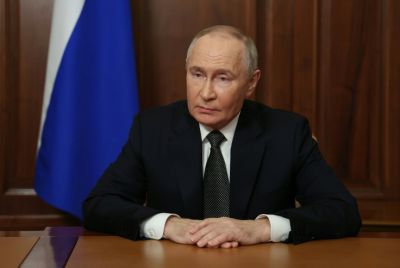Basic Issues in US-China Strategic Dialogue Unchanged - Expert

Interview with Kenneth Lieberthal, Director of the John L Thornton China Centre and a senior fellow in foreign policy at the think-tank Brookings Institution. (For full story, click here)
On Chen Guangcheng - Human Rights
IB Times: What was the US Secretary of State Hillary Clinton's original agenda for the China visit, and how has it changed over the weeks after the Chinese dissident Chen Guangcheng issue came up?
Kenneth Lieberthal: Well, I think the basic agenda regarding the strategic security dialogue and the strategic and economic dialogue has not changed. These are major issues among other things like developments in North Korea, developments in Iran, developments in Syria, developments in the South China Sea, cyber security, maritime security and other economic and trade issues, these are still at the centre of the agenda.
We have in addition the issue concerning Chen Guangcheng and that obviously has taken a fair amount of everyone's time but I don't believe it has actually impacted on the agenda... It's simply playing as an additional factor that everyone obviously has been concerned with.
Q: Let me take up the issues one by one, North Korea, Sudan and others. First of all the human rights issue as the issue has not been under discussion for a long time. Do you think this particular issue will change the relationship between the US and China?
Lieberthal: Well, it's hard to tell. I hope not. Any particular individual case is always complicated, because individual personalities and individual emotions can become serious matters.
We see here Mr Chen got the agreement that he sought, getting his family out of his town, getting assurances of their safety, being allowed to go to law school which has facilities for the blind that is near Beijing and being allowed to stay in the country.
He got all of that and walked out of the US embassy and within several hours was convinced by his friends to repudiate the deal that had been done. That's a kind of individual emotional development you simply can't predict but obviously complicates matters a great deal for the United States and let me say it complicates matters for the Chinese negotiators who agreed to this deal.
And it makes Mr Chen's future unclear. Now, whether that will make it more difficult in the future is just hard to tell. Because both sides I assume are quite disappointed that they thought they had reached an agreement which is tolerable to both the governments and Mr Guangcheng. So I think it's a great shame that Mr Guangcheng chose to repudiate that agreement.
Q: So, where do you think it will go from here now?
Lieberthal: Well I don't know where it will go from here. Mr Guancheng is now reportedly asking for the US to grant him political asylum. He may not understand that, it is not possible. First, the US never grants political asylum to a citizen who is still inside his home country. We [the US] don't have the power to do that.
The US can only grant political asylum to someone who is outside of their home country and asks for asylum, with well-founded fear of persecution for their political beliefs or identity.
Secondly we have no right at all, legally to extend protection to Mr Chen in China. All we can do is, if he is there physically in an [US] embassy or consulate grounds, Chinese authorities cannot enter those grounds without our permission and so effectively you can give him refuge there for whatever period of time you choose.
That may become a diplomatic problem but legally once someone is on your grounds, the host government has no right to go and get them.
When they are not on your [the US] grounds, you have no legal right whatsoever to extend any kind of protection to the citizen remaining in the country and that is the situation here. So I don't know how this will play out. What he [Chen] is asking for is not possible legally. So what ends up happening is I am not sure I'd have to say.
Q: Just to clarify what you exactly said, it's not legal to give him protection while he is still in his home country?
Lieberthal: No. Wait a minute. That is not what I said. I am being careful in my wording. The US government can only grant political asylum when a foreign citizen is outside of his home country. The US government cannot legally; it has no legal standing to give protection to a citizen inside his home country who is not actually on a US diplomatic property in that country. And that is now the situation with Mr Cheng.
Q: Moving on to other issues, how do you see the developments on economic and strategic policies between these two countries after [the US Secretary of Hillary Clinton's visit?
Lieberthal: Well, the visit is still in progress. So I don't know. But the purpose of this SNED is not to reach new agreements; it's rather a very serious strategic level discussion of key issues. On the strategic side these are diplomatic and security issues and on the economic side its economic and trade issues.
The economic and trade side is to find quite broadly, so it includes for example clean energy and that kind of thing. So the agenda is the right agenda. In other words the agenda includes the major issues of concern to both sides.
The leaders of the two delegations know each other well at this point, because they have had these dialogues before plus they have many other contacts.
But this does not produce major new agreements. Frankly one of the major values of the dialogues like these is not so much of the dialogue itself but rather the preparation for it. Because in preparation for it, the staffs of the two sides have very extensive contacts to figure out what to discuss and how best to approach it.
Keep in mind, the leaders when they get together they want to have a good outcome. They don't want to get together to announce that they disagree on everything.
So the fact that you have a dialogue like this, actually serves a positive purpose in moving the countries closer together so the leaders can meet and have a good meeting. That may sound unusual for someone who isn't in government, but the way the governments work that's actually significant.
US-China military transparency
Q: About the visit, let me read Clinton's statement on her first day of the visit. "We are discussing how the talks are opening economic activity to advance prosperity, support innovation, and improve the lives of people, how to promote greater military transparency to avoid misunderstandings. "
Can you clarify what the secretary means when she says "greater military transparency to avoid misunderstandings"?
Lieberthal: Well, the US has long argued that the Chinese military is less transparent about its plans than most militaries are. And that the Chinese military has long argued that the US engages in more intrusive and intensive surveillance than most militaries do.
This is kind of two sides of the same coin, because the Chinese military tells us less about what they are developing, how many set of new planes they plan to acquire, what they plan to do with them, what their strategy is. Take for example, their military white paper... it doesn't have geographical region by region, but most militaries do.
So we are calling for greater transparency and I am sure on their side they are letting us know about their discontent with the surveillance activity that our military undertakes near their territorial waters.
North Korea
Q: Extending the topic over North Korea, I am quoting Clinton's statement once again. "Regarding North Korea, the missile launch seems to suggest that Pyongyang actually used improved relations with the outside world not a goal, but as a threat. And we recognise the role that China is playing and are continuing to work together to make it clear to North Korea..." What does the secretary indicate through these lines on China-North Korea relationship?
Lieberthal: I am sure China is North Korea's largest trading partner. It's the largest investor in North Korea. Their party-to-party relations are at an unusually high level. When Kim Jung-il was alive, he clearly went to China several times in 2010 and 2011 in order to get Chinese support for his succession to his son Kim Jung-un.
And China has very strong security concerns regarding its north-east border and the Korean peninsula. So, for all of those reasons, if any outside country has influence in North Korea, it is China.
I think China's actual influence in their ability to get the North Koreans to do what the China wants them to do is quite limited. But it's probably greater than anyone else's ability. So, given that both the US and China wants the North Korea to stop its nuclear program, we tried to work together where we can...
Q: Is the US disappointed?
Lieberthal: Ah... I think the US always hopes that China can do as much as possible to get North Korea to behave in a more helpful fashion. I think we are often disappointed with the results. But I think the Chinese are often disappointed with the results too.
Sometimes we are disappointed because we think China can make stronger effort to take more initiatives than it does. But I think that right now we are trying to maximise our coordination on North Korean issues.
© Copyright IBTimes 2025. All rights reserved.





















